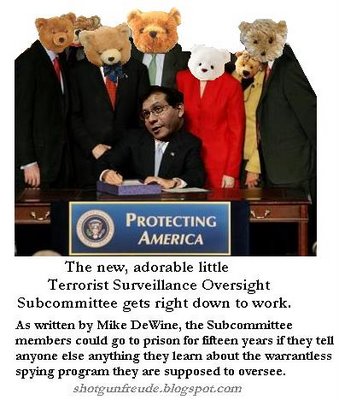Senator Norm Coleman reminds me why this November is a single-issue election: Does the United States Constitution still mean anything?

I got a response from Norm Coleman to the letter I sent my two senators, him and Mark Dayton. It still blows me away that Coleman was first elected to public office (mayor of St. Paul) as a Democrat. Coleman wasted no time playing the war and terror card:
Dear Mr. ...,
Thank you for taking the time to contact me concerning S. Res. 398, a resolution to censure President George W. Bush.
I reject the idea of the President being censured. We must keep in mind that we are a nation at war and a country under threat of terrorist attacks. ...
That's a convenient way to cut off debate - except that neither Coleman nor any other enabler of the new monarchy has even tried to explain how spying without warrants contributes anything at all to national security compared with surveillance under FISA.
He continues:
I believe we must explore this matter deliberately and not use it for partisan political purposes. After careful consideration of the legal and security issues involved, I support the National Security Agency (NSA) Terrorist Surveillance Program[®].
So his need for deliberate exploration of the program was apparently satisfied with his unelaborated careful consideration of the legal and security issues involved. If they satisfy him, I sure wish he would take the time to explain them to me, because from where I'm sitting it sure looks like the President is breaking the law and violating the Constitution.
Joined to the hip with the all-purpose war and terror card is the blanket accusation that any criticism is just for "partisan political purposes". I guess it's inevitable that any effective manner of redressing the administration's law-breaking would reduce the political standing of the administration and its allies relative to those opposing them to defend the Constitution. Since that's inevitable, then any action taken against any crime or corruption could be just as fairly labeled as for "partisan political purposes". If it's a choice between a criminal government and the partisan political purpose of those who oppose it, I'll take the partisans.
Coleman goes on to extoll the virtues of the seven-member Congressional Capitulation Subcommittee in providing greater Constitutional oversight of the illegal domestic spying program, in which the seven senators will have all the authority of adorable fuzzy little teddy bears to investigate and exercise oversight of the program, as I discussed earlier.
Jack Balkin has another powerful post on the administration's self-anointment as a monarchy: while it's dismaying to learn from Abu Gonzales now that the administration is spying on purely domestic communications, it's also completely unsurprising based on the power they've already claimed: namely, the power to wake up every day and decide what the law will be that day. The very definition of a dictator is one who dictates: one who says what the law is from day to day, so that the only law is the dictator's word. It can't at all surprise us that they claim under that power to be entitled to spy on purely domestic communications, because they have already claimed the power to make what the law is a new surprise every day.
That's just the point here, the point that has not yet sunk into the popular consciousness of the Bush power grab: this is not just about spying.
This is about never again being certain what law the administration might or might not feel itself constrained to follow from one day to the next.
Once the President reserves for himself the power to ignore any law that he personally decides isn't compatible with his office, who can possibly say what law we might still be able to rely on? Or what rights, if any, we still have, that the administration does not feel free to ignore?
That is why this November is a single-issue election, with one issue so important that all other questions are insignificant in comparison:
Is our government still based on the United States Constitution? Or is it based only on the whims of what can only be called a dictator?
The entire Republican party has apparently aligned itself with unlimited presidential powers and devoted itself to enabling that coup d'etat from within, allowing the Democratic party by default to become just that, in far more than name: Democratic, as in the party of Democracy - and the only major party on the ballot supporting Democracy as the form of our government.
Even many in the Democratic party have not stood up against dictatorship and for Democracy - but many in the Democratic party have done so, and they will command the consensus once in power. So, the most important task we can accomplish right now is to vote out the legislators supporting a government that declares for itself what the law is and what our rights are, if any, from one day to the next; and to fill the Congress with lawmakers - enough to take control of one or both houses - who are loyal to the United States Constitution and who will defend the United States as a Democracy.

No comments:
Post a Comment